https://www.cais-soas.com/articles/iranian-peoples_articles.htm
https://www.facebook.com/pg/CAIS.SOAS/about/


https://www.cais-soas.com/articles/iranian-peoples_articles.htm
https://www.facebook.com/pg/CAIS.SOAS/about/

One of the main roles of today’s academic libraries, besides acquisition and classification of information materials, is facilitate access and -when necessary- provide guidance and training on how to access resources and information through a wide-range of digital tools and services or online platforms.
It may appear that technological development and digital tools have broadened our access to information, but sometimes we need guidance on how to use these tools to be able to benefit most from them. In order to avoid any unnecessary complication in accessing resources, libraries usually help users by creating step-by-step guides on how to use these tools. In the event of the COVID-19 pandemic, most library services moved online, and so did library guides and tutorials. Over the Summer, the Islamic studies library team produced video tutorials on how to use three important library tools and services: the Hathi Trust Emergency temporary access (ETAS), the McGill Virtual Private Network (VPN), and Islamic Studies library Subject Guides.
In this blog post, we will briefly introduce these tutorials.
“Hathi Trust digital library is a partnership of academic and research libraries offering a collection of millions of titles digitized from libraries around the world.” However, In response to this pandemic, this platform provided a new service in order to provide support for research, teaching and learning during the time of interrupted library services. As such, Hathi Trust Emergency Temporary Access Service (ETAS) provide access to digital material that corresponds to physical material that is held by the libraries. So for McGill library material over two million books from library’s print collection made available online, which counts for over half of McGill’s print collection. This temporary service is only available to McGill students, staff and faculty.
To learn how you can benefit the most from this service, and some tips on how to access the digital books, please watch the video:
McGill Virtual Private Network or VPN is one of the services/methods that provides students, faculty and staff with remote access to Library e-materials. For example, they can access e-books, or e-journals, etc., while they are not on Campus.
Please note that only some of the Library’s e-resources requires VPN connection to grant you access, the rest of e-resources will simply ask you to login with you McGill credential and then you will have access to that e-material.
Whether you chose to or you were required to use VPN to access library’s e-resources, you need to install and configure VPN on your computer/device and set it up. In this video, we will show you how to do this, and where to find the help that might need.
3. How to use McGill Islamic Studies Subject Guides
In doing research we need various range of resources tailored to our very specific topic, more over we need different types of resources from primary resources to online or open access materials and print resources.
Subject guides are one of the useful services that are usually created by the specialized librarian and link you to various resource available in your topic. Islamic Studies Subject Guide is tailored to the courses offered by the McGill Institute of Islamic Studies and is consist of 11 guides related to Islamic studies topic such as Islamic history, Islamic languages: Arabic, Persian, Turkish & Urdu, Middle East history, Ottoman & Turkish studies, Islamic thought and science and etc,. Each Guide provides a list various relevant and current resources that are available at McGill library or elsewhere.
In the event of COVID-19 pandemic, Islamic Studies specialized librarian created a comprehensive list of relevant resources that are available online or can be accessed remotely.
In this video we will show you where to find these guides and how to use them.
Should you have any question about or need any help with one of these tools and services, make sure to contact us at either: islmcirc.library@mcgill.ca or anais.salamon@mcgill.ca.
Credits:
Blog post editor: Anaïs Salamon, Head Librarian;
Videos credits: Islamic Studies Library team : Anaïs Salamon, Head Librarian; Dr. Charles D. Fletcher, Head Library Clerk; Samah Kasha Senior Library Assistance and Ghazaleh Ghanavizchian Senior Library Assistance

SANA is an online database that provides access to digitized periodicals published in Iran from the Qajar era- that marks the beginning of publishing newspapers, up until now.
This platform has been very recently made available publicly by National library and Archives of Iran, in accordance with free access to information and in order to provide equal access to information and knowledge for all. Also to facilitate access to valuable resources available at the National library for scholars and researches.
This platform includes lists and full text digitized periodicals, newspapers and Iranian journals from the beginning up until now in various topics such as Iran’s historical, social, political and economical situation, Persian literature, Islamic related topics; as well as publication about Tehran, Isfahan and other cities.
SANA also includes few periodicals in other languages such as German, English, French and some of them dates back to 1906. Such as :
In this database resources are organized chronologically and then under each era periodicals are listed alphabetically. Also when available, description or information about the history of the publication has been given.
Here is the list of four different time categories of publication accessible through this platform:
( نشریات دوره قاجاریه (۱۱۹۳ – ۱۳۴۴ ق
(نشريات دوره پهلوی اول (۱۳۰۴ – ۱۳۲۰ ش
(نشريات دوره پهلوی دوم (۱۳۲۰ – ۱۳۵۷ ش
( نشریات دوره پس از انقلاب (۱۳۵۷ ش
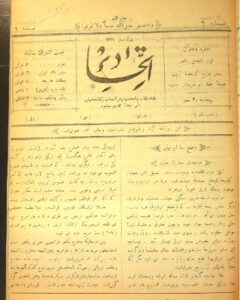
Free registration is required in order to access the resources available at SANA platform.
To register please go this address: https://sana.nlai.ir/register
For more information about National library and Archives of Iran and its many different databases and platforms please go to this page : http://www.nlai.ir/
“Stories From The Middle East And North Africa, And The Spaces In Between”
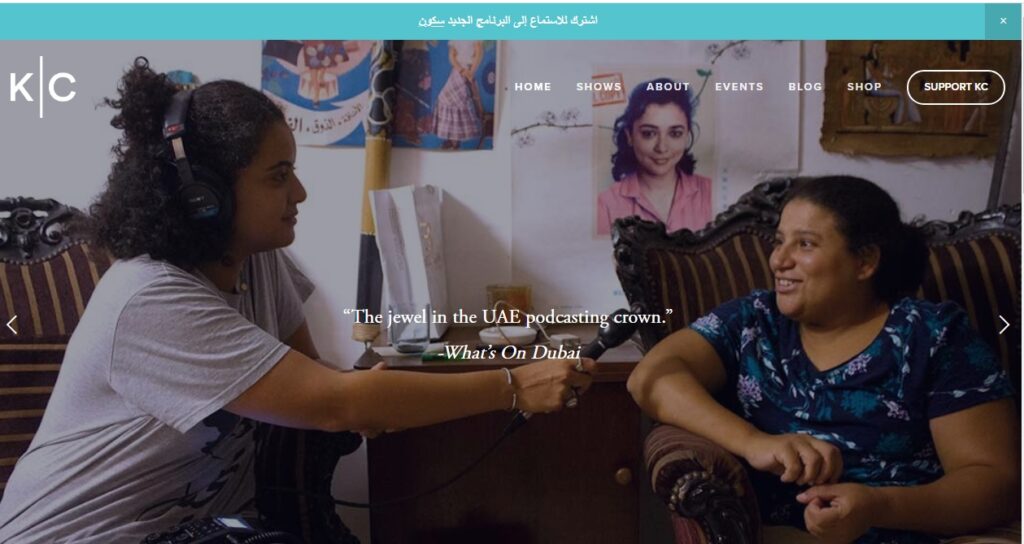
Kerning Cultures is a female-led podcast founded in 2015 and is based in UAE. It is the first venture-funded podcast company in the Middle East. This podcast is Hebah Fisher’s idea; she is the co-founder of Kerning Cultures. This podcast formed in response to the lack of mainstream media in the Middle East, that young generation can relate to, also it came to existence aiming to open a new window to this misunderstood parts of the world.


This podcast started as a start-up and with very little help, the first three years Hebah Fisher (co-founder and CEO) and Razan Alzayani (co-founder and former executive producer) of the project, invested all their savings in this project, they worked for their” mission of telling stories of places they call home”. They aim to re-introduce the region to themselves and Middle Eastern audiences, as well as to introduce it to non-Middle Eastern listeners through their stories, stories that anyone even from very far away can relate to. So This podcast is being produced in Arabic and English.

Usually the image of the Middle East, pictured by the main stream media is biased, one-sided and heavily politicized.
This podcast tries give an image of Middle East and North Africa, beyond the stereotypical characteristic and common generalizations, by covering different topics and telling stories of history, science, culture, current affairs from these regions and Middle East. Each episode somehow unveils the reality of life in the region and aims to give a balanced picture of its people, and their nuanced lived experience.
Various topics are covered in this podcast. for example “Birthplace of the UAE” is about Public Health; “Fight or Flight” tells the story of a kite maker from Afghanistan who immigrated to the US and “Reviving Hamra Street” is about Beirut and its street art.
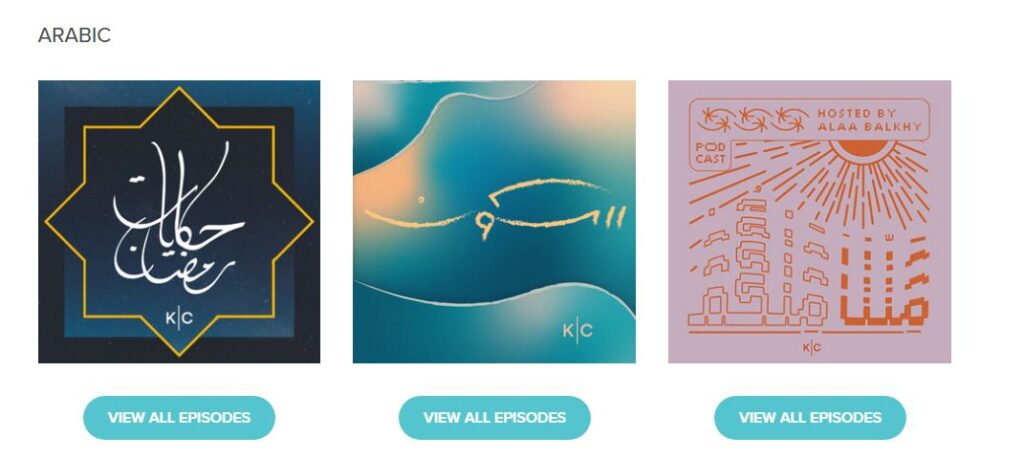
Or in the episode, “Not Just My Hijab” a two-part series, women with different backgrounds talk about their stories and experiences of wearing Hijab or, discontinuing wearing Hijab and what it means to them. This narrates the lived experience of those women with their voices, which is different from the narrative of an article in a prestigious International journal picturing women wearing Hijab and mostly in relation to religious matter. There are many factors that impact and form people’s lives, belief system, culture and collective memories , though usually these factors are excluded from media narrative, Kerning Cultures is trying to shed light on those factors and various dimension of life in the Middle East.
In addition to its valuable content, Kerning Cultures choice of media, podcast and use of voice, makes a meaningful connection to the region through the old tradition of oral history and story telling.
Kerning Cultures was described by its listener from different corner of the world as: informative, touching, intriguing and a must listen.
The Middle East Institute (MEI) located in Washington, D.C. was founded in 1946 as a non-profit organization by George Camp Keiser a Middle East scholar. Aiming to promote and transmit knowledge of Middle East, MEI has been active in leading research as well as cultural, academic and educational activities, which all together led to the formation of various centres of Policy, Education and Art and Culture. In addition to its effort in producing and expanding knowledge about Middle East, MEI became an intellectual hub and gave platform to regional experts whose works provide a balance outlook and understanding of the region. Besides organizing conferences and educational programs such as training languages spoken in Middle East like Arabic, Turkish, Persian, Hebrew; it also provides access to many useful online resources and publications about Middle East, some of which will be mentioned briefly below.
Middle East Journal:
MEI publishes The Middle East Journal since 1947, this journal as one of the oldest peer-reviewed publication in studying Middle East provides original researches and source materials covering wide area from Morocco to Pakistan and Central Asia.
“The Journal provides the background necessary for an understanding and appreciation of the region’s political and economic development, cultural heritage, ethnic and religious diversity.”
Access this to journal from McGill library here.
Digital collection:
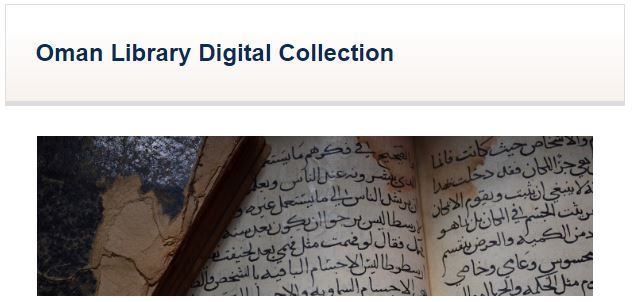
MEI via its Oman Library digital collection provides access to hundreds of digitized rare books and manuscripts about/of Middle Eastern studies for researchers and scholars from around the world. This online collection holds materials covering wide range of topics from history, culture and literature available in various languages like English, French, Arabic, Persian, Urdu, Farsi, Ottoman Turkish and Turkish. This collection includes rare material from 1700 to 1920 as well as its own publications published by MEI from 1960 to 2004.
Arts & Culture Center:

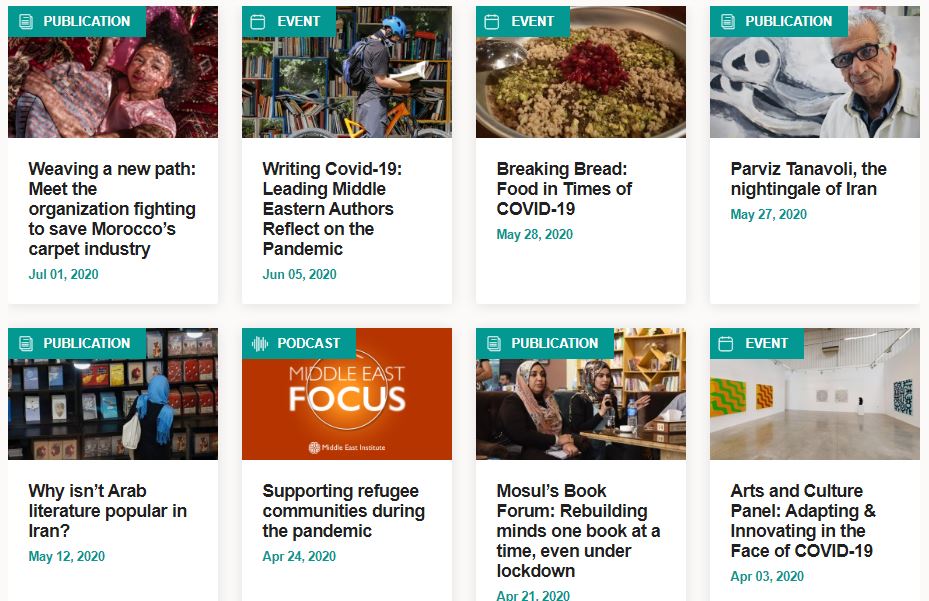
Middle East Institute, besides organizing cultural events and exhibition through its Art and Culture Center, uses this platform to provide access to a hundreds of different types of online material from media release to podcast, journal article and news. This platform aims to create an environment that facilitates conversation, cross cultural understanding as well as to promote Middle Eastern artist works.
 Allama Iqbal Poetry کلام علامہ محمد اقبال is a website established by a team of freelancer gathering all Iqbal’s Poetry works in one place.
Allama Iqbal Poetry کلام علامہ محمد اقبال is a website established by a team of freelancer gathering all Iqbal’s Poetry works in one place.
This page provides free access to a complete collection of Urdu and Persian Poetry of Allama Iqbal, as well as English translation, transliteration and Urdu explanation of the poetries.
Muhammad Iqbal (9 November 1877 – 21 April 1938) known as Allama Iqbal was a leading and prominent Persian and Urdu poet of India in the first half of the 20th century. He was also a distinguished philosopher, theorist, and barrister in British India, and he was known to be the “Spiritual Father of Pakistan” because of his contribution to the nation.
His poetry works are cherished internationally among literature scholars’ community as well as among Indians, Pakistanis, Iranians, Afghans and Bangladeshis. Along with his fame as a poet, he is also known as one of the Muslim philosophical thinkers in the modern era therefor his Urdu and English lectures and letters, believed to have been important in political, social, religious and cultural discourses.
To read more about Allama Iqbal and his work, Encyclopedia Iranica has an article about him, access here.
Allama Iqbal Poetry is a searchable website with the possibility of searching for words, couplet, verse and shair in Iqbal’s poetry. Moreover, these 11 complete Urdu and Persian books of him are accessible to be browsed too.
Digital Persian Archives project is an online archival image database containing thousands of public and private historical documents from Iran and Central Asia up to the 20th century. It includes royal decrees and orders, official correspondence, and shari’a court documents, such as contracts of sale and lease, vaqf deeds, marriage contracts, and court orders.
This project initially was launched in 2003 and by Department of Islamic Studies at the Albert-Ludwigs-Universität Freiburg and it was called Asnad.org. however, after years of progress and improvement by various departments, in 2019 it was moved to the University of Bamberg where it is under the supervision of the Chair of Iranian Studies.
The main goal of Digital Persian Archives project is to facilitate locating and accessing primary resources and archival material. Therefore, to do so virtual archive of Persian documents has been created as a searchable database. Materials can be searched by particular period or region, specific person, topic or location.
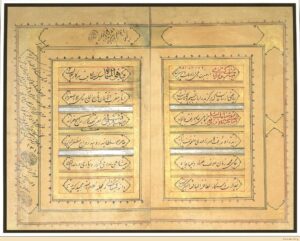
Marriage contract between Hajji Muhammad Zaman ‘Allaf and Sakinah Sultan. 18 Sha’ban 1317 / 22.12.1899 – 22.12.1899
A wide range of documents have been included in this project from medieval and early modern periods up to 20th century of Iranian and Central Asian history, factoring in “the older, the more precious” and the quality and readability of the documents in selection criteria. However, as for the language and geographical scope of this project, Persian is rather representing a cultural characteristic than a rigid linguistic specification. The same way Persia was understood in its historical and geographical sense, therefore documents in other languages like Arabic were included, when the connection to Persian cultural influence was clear. Their geographical selection criteria were outlined as below:
“The same is true for the geographical range we seek to cover. The core areas are defined by the shifting historical boundaries of Iran, thus including at times regions such as Anatolia, the Caucasus and Middle Asia. Another criterion is the use of Persian as administrative language as in Central Asia or India, although the systematic integration of Indian documents is beyond the project’s scope.” (Selection criteria)
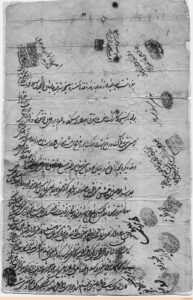
Sultanmuhammad b. Janmuhammad Bayg sold two pieces of land to Imamvirdi Khan Qiriqlu [Afshar] which are located in Abivard near Mashhad for the amount of 70 Tuman; contract includes a musalahah; Imamvirdi Khan was among the generals of Nadir Shah and for some time held the office of Nazir-i buyutat-i khassah. Date: 25 Jumada II 1156 / 16.8.1743 – 16.8.1743
Mueseum With No Frontier (MWNF) has launched a campaign to have more of their museum and exhibitions related content translated into Arabic, in order to give greater access to art and culture to more people from around the world.
“We are in need of support to translate more of our database to Arabic so those in Arab countries and beyond can access our online Explore Islamic Art Collections and other exhibitions.”
If interested, contact them at: office@museumwnf.net
Brief background about Museum With No Frontier:
MWNF was founded as an independent non-profit organization in 1995 on the initiative of Eva Schubert. MWNF program is a collaboration between public and private partners from all over the world and its main activities consist of “MWNF Virtual Museum and related MWNF Galleries and the MWNF Exhibition Trails and related books and travel program.”
MuseumWNF is determined to link cultures via a diversified knowledge of history, heritage and culture encourage practicing peaceful coexistence. Moreover, part of their mandate is cooperation with the Arab world and promoting Islamic art.
“Contributing to better knowledge of Arab countries and cooperating with Arab partners on educational and cultural tourism projects has been an MWNF priority since its foundation. Since 2010 MWNF has had a partnership with the League of Arab States to promote awareness of the Arab world’s history and cultural legacy through joint projects.”
More information about MWNF can be found here.
There is also volunteer opportunities for native-language translators to help with translations:
English to Arabic
English to Spanish
German to English
Spanish to English
Persian Heritage Magazine is an independent, non-political, non-governmental publication first published in 1996 by Shahrokh Ahkami, the Editor.
Persian heritage is a quarterly publishing magazine about culture and history of Iran. It is trying to respond to its readers’ need -Iranian outside of Iran- by keeping them informed with update information on the richness and diversity of Iranian culture and heritage, as well as to facilitate inter-cultural interaction by reaching to those non-Persians yet interested in Persian heritage.
Therefore every issue of the magazine is being published in Farsi and English and covers various topics from Arts and culture (miniature, poetry,etc.) to prehistoric findings in Iran as well as reviewing recent exhibition in or about Iran’s history and culture.
This magazine is published by Persian Heritage, INC. The online version is freely accessible.
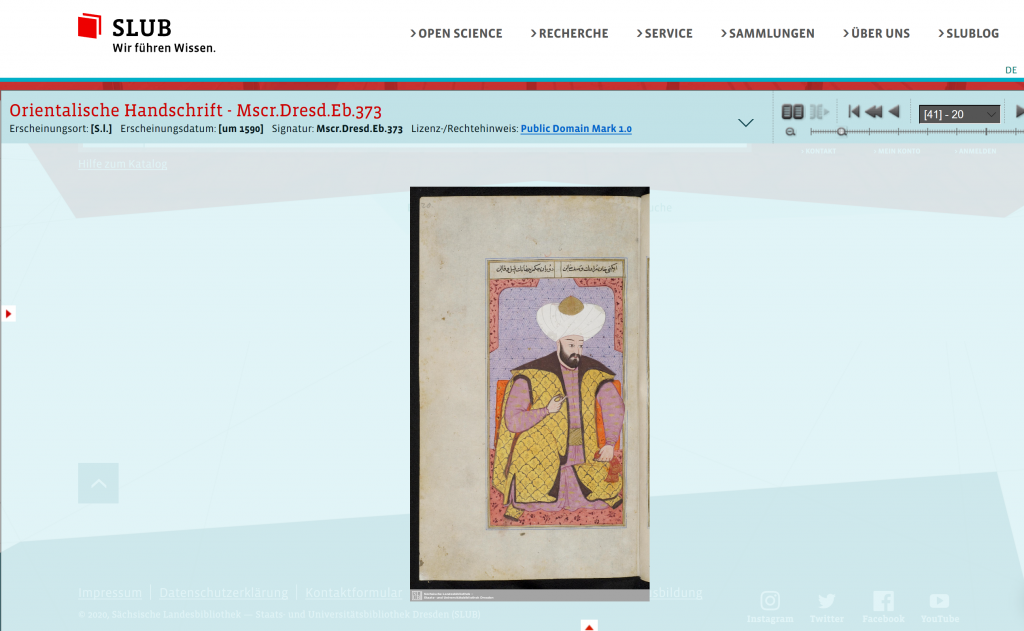 The Saxon State and University Library Dresden (SLUB) is a research library in Germany and its Oriental Manuscript collection houses a great collection of 448 Islamic manuscripts. The collection of Ottoman manuscripts was acquired by the library in the 18th and 19th century. This collection also consists of Tibetan and Mongolian as well as Chinese, Japanese, Indonesian, Sanskrit, Hebraic and Ethiopian manuscripts.
The Saxon State and University Library Dresden (SLUB) is a research library in Germany and its Oriental Manuscript collection houses a great collection of 448 Islamic manuscripts. The collection of Ottoman manuscripts was acquired by the library in the 18th and 19th century. This collection also consists of Tibetan and Mongolian as well as Chinese, Japanese, Indonesian, Sanskrit, Hebraic and Ethiopian manuscripts.
Some of the manuscripts in this collection are unique in terms of integrity of the item or rarity of its content for example. Below is the list of few items that was introduced as “Extraordinary Volumes” by the SLUB along with a description of the manuscript and a link to its digitized version.
Kitab-i Dede Korkut (Mscr.Dresd.Ea.86): The only fully preserved manuscript narrating national epic of the Oguzes, a nomadic Turkish tribe.
Mulana Fuzûli, Benk u Bâde (Mscr.Dresd.Eb.362): An Ottoman poem, written on rose paper, narrating a dispute about rank between wine and hash (cannabis).
Kemāl Paša-Zāde: Tevârîh-i Âl-i Osmân (Mscr.Dresd.Eb.391): The story of the Ottomans in a two-volume manuscript with 25 depictions of cities, fortifications and harbor facilities.
Seyyid Loqmān, Qiyā-fet al-insānīyeh fī shemā’il othmanīyeh (Mscr.Dresd.Eb.373): Book of the Ottoman Characteristics, containing 12 portraits of Turkish sultans.
Machsor mecholl haschana (Mscr.Dresd.A.46.a): Jewish prayer book for the High Holidays, in Southern German handwriting from the end of the 13th century.
Moreoverو “Catalogus codicum manuscriptorum orientalium Bibliothecae Regiae Dresdensis”, is the inventory of most of Islamic manuscripts except the new acquisitions. This index was published in Leipzig in 1831 by Heinrich Leberecht Fleischer (1801-1888) and is available from here diglib.hab.de/wdb.php